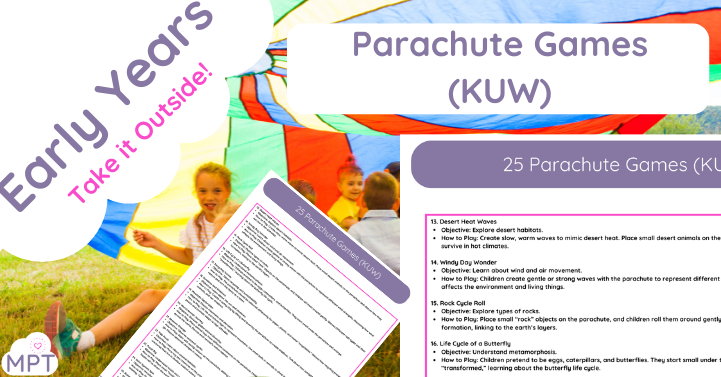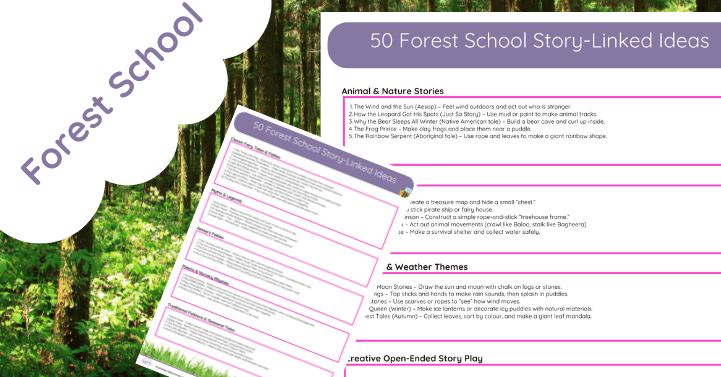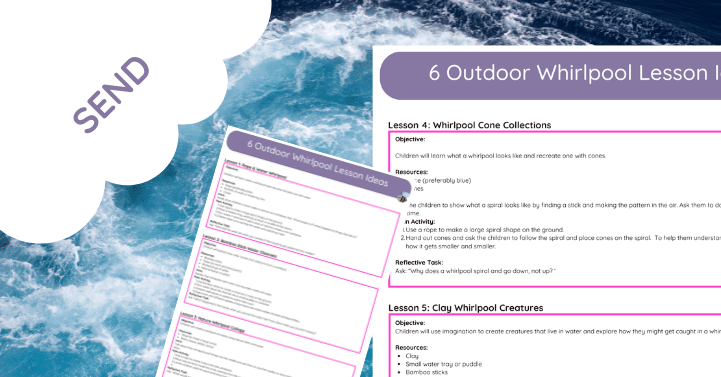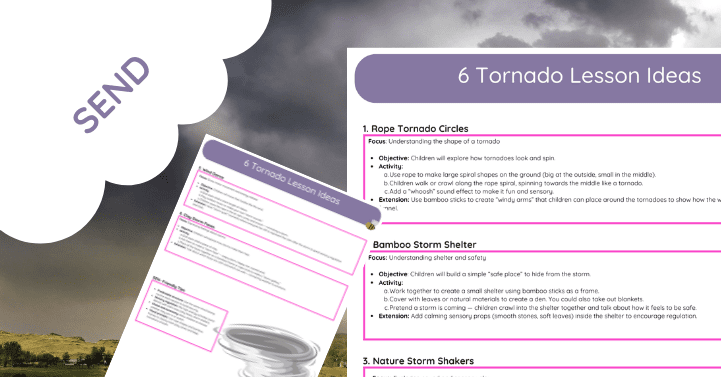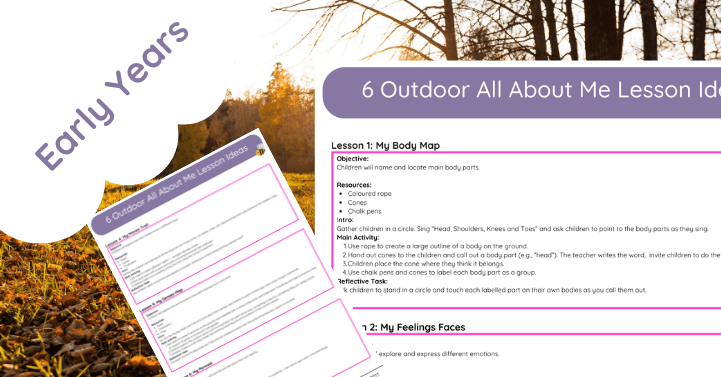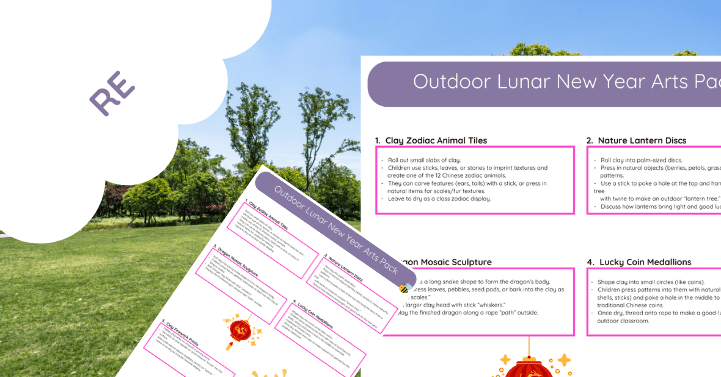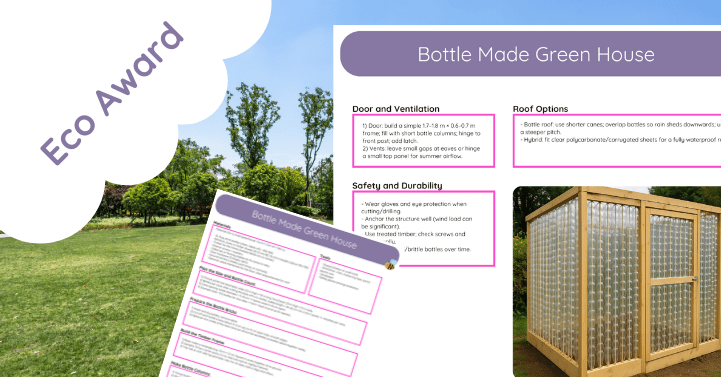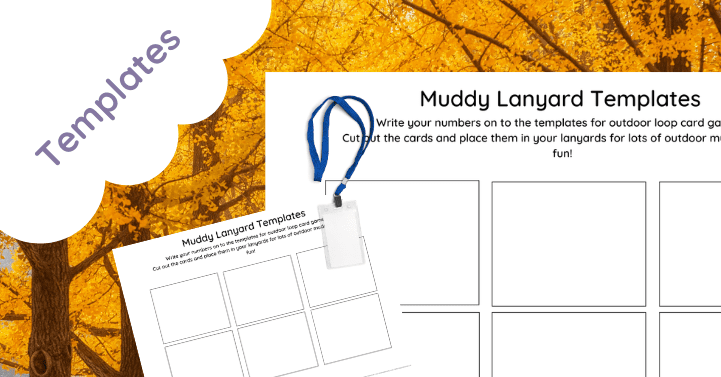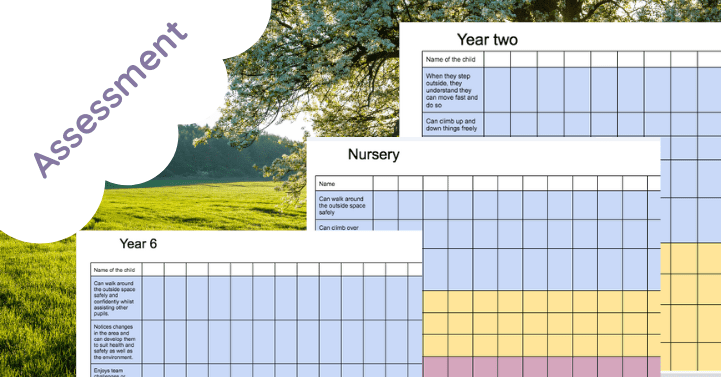Early Years Parachute Games – Knowledge & Understanding of the World Idea Pack
Unlock the world’s wonders with our Parachute Games for Knowledge & Understanding of the World idea pack! Specially designed for early years educators, this collection of 25 parachute games inspires curiosity and exploration, introducing young children to essential concepts in science, geography, nature, and environmental awareness. Using a playful, hands-on approach, each game encourages children to discover the world around them while building teamwork, motor skills, and social-emotional understanding.
Key Features:
- World-Focused Learning: Each game is crafted to introduce young children to fundamental topics, including ecosystems, weather, seasons, habitats, and global diversity.
- Muddy Puddle Teacher Inspired: Games align with the Muddy Puddle Teacher’s outdoor and sensory-based learning philosophy, fostering a connection to nature through physical, interactive play.
- Easy to Follow & Adapt: Designed for ease, these games have clear, simple instructions and adaptable activities to fit various group sizes, ages, and learning settings.
- Supports Holistic Development: In addition to building knowledge, the games promote gross motor skills, cooperation, creativity, and self-regulation, providing a well-rounded educational experience.
- Perfect for Indoors & Outdoors: Whether in the classroom, gym, or outside in nature, these parachute games bring global learning to life with versatile and engaging activities.
Sample Games Included:
- Weather Waves: Explore different weather types as children create gentle breezes or big storm waves, learning about the impact of weather on our world.
- Animal Habitat Hide and Seek: Introduce habitats by “hiding” animal toys and discussing where they live, from forests to oceans to deserts.
- Rain Cycle Relay: Teach the water cycle through movement and storytelling as children pretend to be raindrops, clouds, and rivers.
- Pollination Dance: Discover the magic of pollination with a bee-themed game that helps children understand how plants and insects work together in nature.
Bring a world of knowledge to your early years classroom with this dynamic, educational Parachute Games for Knowledge & Understanding of the World idea pack. Perfect for creating meaningful play that inspires young minds to explore, learn, and grow!
The Importance and Benefits of Parachute Games for Neurodivergent Children
Parachute games have long been a favorite in early childhood education. Not only do these activities provide endless fun, but they also play a powerful role in supporting the development of neurodivergent children—those who experience neurological differences such as autism, ADHD, sensory processing disorders, and others. Parachute games help create an inclusive and supportive learning environment where neurodivergent children can thrive, develop essential skills, and build self-confidence.
This post will explore the unique ways parachute games benefit neurodivergent children, focusing on sensory, social, and emotional growth, and provide external resources for more in-depth information.
1. Sensory Regulation and Input
Many neurodivergent children have unique sensory needs. Parachute games provide a structured yet flexible environment that can help regulate sensory experiences. They offer different types of sensory input that can be tailored to each child’s needs:
- Proprioceptive and Tactile Input: Grasping, lifting, and moving the parachute provides valuable proprioceptive feedback, which can help children feel grounded and more in control of their movements. This type of input is essential for children who need support with body awareness.
- Visual and Auditory Stimulation: The colourful parachute and rhythmic sounds can be calming for children who enjoy sensory-rich visuals and sounds while still being gentle and non-overwhelming.
Read more on sensory processing and support strategies on Pathways.org and Understood.org, which both offer guidance on meeting sensory needs in neurodivergent children.
2. Encouraging Social Interaction and Communication Skills
Social interaction can sometimes feel intimidating for neurodivergent children. Parachute games are naturally collaborative but non-competitive, which makes them a great option for encouraging social interaction in a low-pressure way.
- Building Peer Connections: Parachute games are inherently cooperative; children must work together to keep the parachute moving. This builds a sense of camaraderie and helps neurodivergent children experience positive social interactions.
- Non-Verbal Communication and Teamwork: Many parachute games rely on simple gestures, eye contact, and physical coordination rather than complex verbal instructions, making them accessible for children who may communicate differently.
- Learning Social Cues and Turn-Taking: Parachute play often involves waiting for turns, following cues, and listening, which can support children in developing foundational social skills.
For more on social skills development, The National Association for the Education of Young Children (NAEYC) provides resources on building social and emotional skills through play, and Autism Speaks offers social play strategies for children on the autism spectrum.
3. Supporting Emotional Regulation and Building Confidence
Emotional regulation is a crucial skill for all children, and parachute games create a safe space for neurodivergent children to explore and express their emotions in a controlled setting.
- Predictable Structure: Parachute games often follow a predictable routine, which provides structure and consistency. This predictability is especially helpful for neurodivergent children who may feel anxious in new or unpredictable situations.
- Boosting Self-Confidence: Successfully participating in parachute games allows children to feel a sense of achievement. Simple successes—like creating a big wave or taking turns—can significantly boost their confidence and self-esteem.
- Expressing Big Emotions: Parachute games allow children to engage in big, expressive movements, which can help them release built-up emotions and experience joy in a shared environment.
Visit the Child Mind Institute and The Center on the Developing Child at Harvard University to explore more about emotional regulation for neurodivergent children.
4. Promoting Physical Development and Motor Skills
Parachute games offer children a variety of physical activities that build gross and fine motor skills, which are essential for neurodivergent children who may have challenges with coordination or muscle strength.
- Gross Motor Skills: Actions like lifting, shaking, and running around the parachute develop gross motor skills and improve overall physical coordination.
- Fine Motor Skills: Holding onto the parachute handles, pulling at a specific rhythm, and even grabbing small objects off the parachute help strengthen fine motor skills, which contribute to better hand-eye coordination.
- Balance and Spatial Awareness: Many neurodivergent children need support with spatial awareness, and parachute games provide a safe space to practice moving in relation to others and understanding spatial boundaries.
For more on promoting physical development in young children, check out KidsHealth and American Academy of Pediatrics (AAP).
5. Engaging Creativity and Imagination
Parachute games encourage children to use their imaginations and explore creative thinking, which is essential for cognitive development.
- Imaginative Play: Parachute games allow for creative, open-ended play. The parachute can become anything—a rainbow, an ocean, a forest floor, or even a magic carpet! Children can use their imaginations to engage with the world around them.
- Role-Playing and Storytelling: Some parachute games involve pretending to be animals or natural elements, which helps children practice role-playing and storytelling skills. This also supports cognitive flexibility and abstract thinking, which benefit neurodivergent children.
- Flexibility Within Structure: Parachute games have structure but also allow flexible play. This balance allows children to explore creatively while feeling safe and guided.
To learn more about the benefits of creative play in early childhood, visit Scholastic Parents and PBS Parents.
Tips for Adapting Parachute Games for Neurodivergent Children
To ensure that neurodivergent children fully benefit from parachute games, here are some helpful tips for creating a supportive and inclusive experience:
- Use Visual Cues and Simple Instructions: Many neurodivergent children benefit from visual aids, such as picture cards or coloured markers, to help guide them through each game.
- Adjust for Sensory Needs: Offer options for children to hold onto the parachute loosely, avoid loud sounds, or choose a less stimulating version of each game.
- Allow for Different Participation Levels: Some children may prefer watching before fully engaging. Let them participate at their own comfort level, whether that’s holding the edge of the parachute or observing.
- Provide Structured Transitions: Transitioning from one game to the next can feel overwhelming. To create a more comfortable experience, give children ample time and clear signals for each change.


